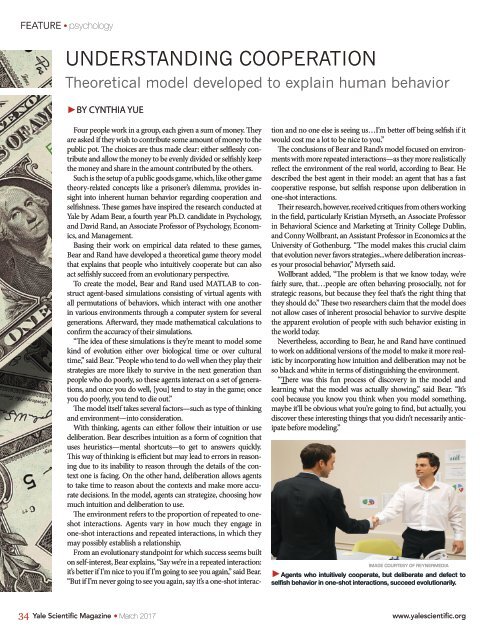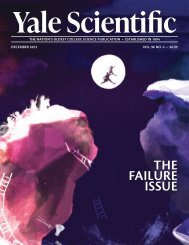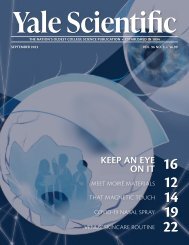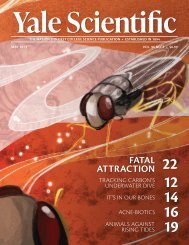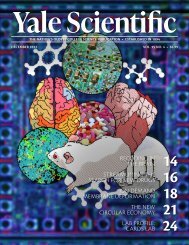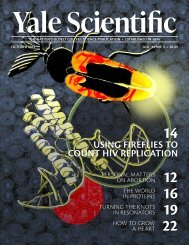YSM Issue 90.2
Create successful ePaper yourself
Turn your PDF publications into a flip-book with our unique Google optimized e-Paper software.
FEATURE<br />
psychology<br />
UNDERSTANDING COOPERATION<br />
Theoretical model developed to explain human behavior<br />
►BY CYNTHIA YUE<br />
Four people work in a group, each given a sum of money. They<br />
are asked if they wish to contribute some amount of money to the<br />
public pot. The choices are thus made clear: either selflessly contribute<br />
and allow the money to be evenly divided or selfishly keep<br />
the money and share in the amount contributed by the others.<br />
Such is the setup of a public goods game, which, like other game<br />
theory-related concepts like a prisoner’s dilemma, provides insight<br />
into inherent human behavior regarding cooperation and<br />
selfishness. These games have inspired the research conducted at<br />
Yale by Adam Bear, a fourth year Ph.D. candidate in Psychology,<br />
and David Rand, an Associate Professor of Psychology, Economics,<br />
and Management.<br />
Basing their work on empirical data related to these games,<br />
Bear and Rand have developed a theoretical game theory model<br />
that explains that people who intuitively cooperate but can also<br />
act selfishly succeed from an evolutionary perspective.<br />
To create the model, Bear and Rand used MATLAB to construct<br />
agent-based simulations consisting of virtual agents with<br />
all permutations of behaviors, which interact with one another<br />
in various environments through a computer system for several<br />
generations. Afterward, they made mathematical calculations to<br />
confirm the accuracy of their simulations.<br />
“The idea of these simulations is they’re meant to model some<br />
kind of evolution either over biological time or over cultural<br />
time,” said Bear. “People who tend to do well when they play their<br />
strategies are more likely to survive in the next generation than<br />
people who do poorly, so these agents interact on a set of generations,<br />
and once you do well, [you] tend to stay in the game; once<br />
you do poorly, you tend to die out.”<br />
The model itself takes several factors —such as type of thinking<br />
and environment—into consideration.<br />
With thinking, agents can either follow their intuition or use<br />
deliberation. Bear describes intuition as a form of cognition that<br />
uses heuristics—mental shortcuts—to get to answers quickly.<br />
This way of thinking is efficient but may lead to errors in reasoning<br />
due to its inability to reason through the details of the context<br />
one is facing. On the other hand, deliberation allows agents<br />
to take time to reason about the contexts and make more accurate<br />
decisions. In the model, agents can strategize, choosing how<br />
much intuition and deliberation to use.<br />
The environment refers to the proportion of repeated to oneshot<br />
interactions. Agents vary in how much they engage in<br />
one-shot interactions and repeated interactions, in which they<br />
may possibly establish a relationship.<br />
From an evolutionary standpoint for which success seems built<br />
on self-interest, Bear explains, “Say we’re in a repeated interaction:<br />
it’s better if I’m nice to you if I’m going to see you again,” said Bear.<br />
“But if I’m never going to see you again, say it’s a one-shot interaction<br />
and no one else is seeing us…I’m better off being selfish if it<br />
would cost me a lot to be nice to you.”<br />
The conclusions of Bear and Rand’s model focused on environments<br />
with more repeated interactions—as they more realistically<br />
reflect the environment of the real world, according to Bear. He<br />
described the best agent in their model: an agent that has a fast<br />
cooperative response, but selfish response upon deliberation in<br />
one-shot interactions.<br />
Their research, however, received critiques from others working<br />
in the field, particularly Kristian Myrseth, an Associate Professor<br />
in Behavioral Science and Marketing at Trinity College Dublin,<br />
and Conny Wollbrant, an Assistant Professor in Economics at the<br />
University of Gothenburg. “The model makes this crucial claim<br />
that evolution never favors strategies...where deliberation increases<br />
your prosocial behavior,” Myrseth said.<br />
Wollbrant added, “The problem is that we know today, we’re<br />
fairly sure, that…people are often behaving prosocially, not for<br />
strategic reasons, but because they feel that’s the right thing that<br />
they should do.” These two researchers claim that the model does<br />
not allow cases of inherent prosocial behavior to survive despite<br />
the apparent evolution of people with such behavior existing in<br />
the world today.<br />
Nevertheless, according to Bear, he and Rand have continued<br />
to work on additional versions of the model to make it more realistic<br />
by incorporating how intuition and deliberation may not be<br />
so black and white in terms of distinguishing the environment.<br />
“There was this fun process of discovery in the model and<br />
learning what the model was actually showing,” said Bear. “It’s<br />
cool because you know you think when you model something,<br />
maybe it’ll be obvious what you’re going to find, but actually, you<br />
discover these interesting things that you didn’t necessarily anticipate<br />
before modeling.”<br />
IMAGE COURTESY OF REYNERMEDIA<br />
►Agents who intuitively cooperate, but deliberate and defect to<br />
selfish behavior in one-shot interactions, succeed evolutionarily.<br />
34 Yale Scientific Magazine March 2017 www.yalescientific.org


